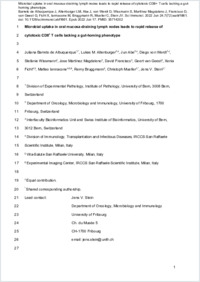Microbial uptake in oral mucosa-draining lymph nodes leads to rapid release of cytotoxic CD8(+) T cells lacking a gut-homing phenotype
DOKPE
- Barreto de Albuquerque, Juliana ORCID Division of Experimental Pathology, Institute of Pathology, University of Bern, 3008 Bern, Switzerland
- Altenburger, Lukas M. ORCID Department of Oncology, Microbiology and Immunology, University of Fribourg, 1700 Fribourg, Switzerland
- Abe, Jun ORCID Department of Oncology, Microbiology and Immunology, University of Fribourg, 1700 Fribourg, Switzerland
- von Werdt, Diego ORCID Division of Experimental Pathology, Institute of Pathology, University of Bern, 3008 Bern, Switzerland
- Wissmann, Stefanie Department of Oncology, Microbiology and Immunology, University of Fribourg, 1700 Fribourg, Switzerland
- Martínez Magdaleno, Jose ORCID Department of Oncology, Microbiology and Immunology, University of Fribourg, 1700 Fribourg, Switzerland
- Francisco, David Interfaculty Bioinformatics Unit and Swiss Institute of Bioinformatics, University of Bern, 3012 Bern, Switzerland
- van Geest, Geert ORCID Interfaculty Bioinformatics Unit and Swiss Institute of Bioinformatics, University of Bern, 3012 Bern, Switzerland
- Ficht, Xenia ORCID Division of Immunology, Transplantation and Infectious Diseases, IRCCS San Raffaele Scientific Institute, Milan, Italy
- Iannacone, Matteo ORCID Division of Immunology, Transplantation and Infectious Diseases, IRCCS San Raffaele Scientific Institute, Milan, Italy
- Bruggmann, Rémy ORCID Interfaculty Bioinformatics Unit and Swiss Institute of Bioinformatics, University of Bern, 3012 Bern, Switzerland
- Mueller, Christoph ORCID Division of Experimental Pathology, Institute of Pathology, University of Bern, 3008 Bern, Switzerland
- Stein, Jens V. ORCID Department of Oncology, Microbiology and Immunology, University of Fribourg, 1700 Fribourg, Switzerland
- 17.06.2022
Published in:
- Science Immunology. - 2022, vol. 7, no. 72, p. 1-15
English
The gastrointestinal (GI) tract constitutes an essential barrier against ingested microbes, including potential pathogens. Although immune reactions are well studied in the lower GI tract, it remains unclear how adaptive immune responses are initiated during microbial challenge of the oral mucosa (OM), the primary site of microbial encounter in the upper GI tract. Here, we identify mandibular lymph nodes (mandLNs) as sentinel lymphoid organs that intercept ingested Listeria monocytogenes (Lm). Oral Lm uptake led to local activation and release of antigen-specific CD8+ T cells that constituted most of the early circulating effector T cell (TEFF) pool. MandLN-primed TEFF disseminated to lymphoid organs, lung, and OM and contributed substantially to rapid elimination of target cells. In contrast to CD8+ TEFF generated in mesenteric LN (MLN) during intragastric infection, mandLN-primed TEFF lacked a gut-seeking phenotype, which correlated with low expression of enzymes required for gut-homing imprinting by mandLN stromal and dendritic cells. Accordingly, mandLN-primed TEFF decreased Lm burden in spleen but not MLN after intestinal infection. Our findings extend the concept of regional specialization of immune responses along the length of the GI tract, with CD8+ TEFF generated in the upper GI tract displaying homing profiles that differ from those imprinted by lymphoid tissue of the lower GI tract.
- Faculty
- Faculté des sciences et de médecine
- Department
- Département de Médecine
- Language
-
- English
- Classification
- Medicine
- License
- License undefined
- Open access status
- green
- Identifiers
-
- DOI 10.1126/sciimmunol.abf1861
- PMID 35714202
- Persistent URL
- https://folia.unifr.ch/unifr/documents/320537
Statistics
Document views: 53
File downloads:
- Barreto_SciImm_2022.pdf: 247
